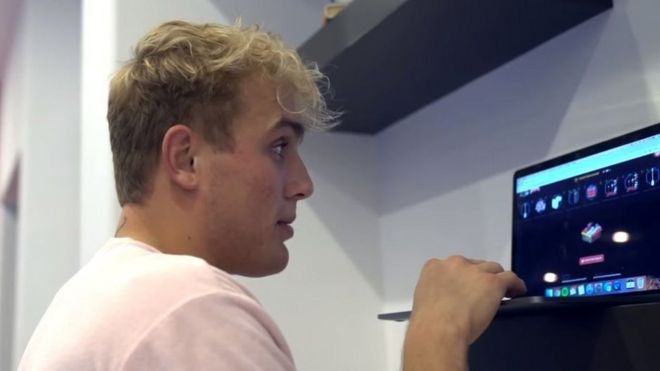YouTube stars under fire for 'loot box' videos
High-profile YouTubers have faced a barrage of criticism for promoting a 'loot box' website.
Videos by Jake Paul and Brian "RiceGum" Le feature a company called Mystery Brand, which exchanges money for unidentified prizes.
In a comment to the BBC, the site said its service is "not comparable to gambling".
The UK Gambling Commission has said it is assessing Mystery Brand and "will be taking appropriate action."
- PewDiePie hackers take over Google smart TV systems
- Talking horses and perfect faces: The rise of virtual celebrities
The videos by Mr Paul and Mr Le show them clicking on a variety of virtual boxes, spending thousands of dollars in total.
Boxes on the Polish-based website range in price from under £2 to more than £1,000, and are split into categories, including Apple products, Supreme branded clothing and games consoles.
In their videos, the YouTube stars win a variety of items, from Converse trainers to an iPhone XS smartphone. Mr Paul's video is titled "I Spent $5,000 ON MYSTERY BOXES & You WONT Believe WHAT I GOT... (insane)."
After the videos were published, a number of other YouTubers criticised the sponsorship. Pewdiepie called the move an "oopsie", while Daniel "Keemstar" Keem - who presents the popular DramaAlert channel - said he was offered $100,000 from the company but turned it down.
A spokesperson for Mystery Brand told the BBC that this is "a blatant lie", and that it "never contacted any DramaAlert representatives".
The spokesperson compared the site's service to subscription 'mystery boxes', which offer deliveries of surprise items, often under monthly subscriptions:
"Mystery Brand is not much different from those projects, except for the fact that we make the whole process of buying and receiving items from a Mystery Box fast and transparent in real time."
After facing the backlash, Mr Le posted a video pointing to a number of other Youtubers who previously promoted Mystery Brand, and offered an apology:
"Was it even worth doing this deal?" he asks in the clip. "Was it even worth all the controversy? I do feel bad. I know I'm kind of defending myself but I do know I'm somewhat in the wrong."
Mr Paul tweeted: "kids just a reminder.. don't gamble!"
Is it legal?
Further action will hinge on whether Mysterybrand.net is deemed to be a gambling website.
The Gambling Commission confirmed with the BBC that Mysterybrand.net does not have a Gambling Commission licence and outlined how they tackle websites overseas.
UK law forbids gambling companies from advertising their services using anyone under the age of 25. Jake Paul is 21 years old. Brian Le is 22 years old.
However, the UK Advertising Standards Agency (ASA) said that because the YouTubers are based in the US and the ads do not appear to be actively targeting UK consumers, it "will not be taking any action on this occasion."
A YouTube spokesperson told the BBC it "believes that creators should be transparent with their audiences if their content includes paid promotion of any kind."
"Our policies make it clear that YouTube creators are responsible for ensuring their content complies with local laws, regulations and YouTube Community Guidelines. If content is found to violate these policies, we take action to ensure the integrity of our platform, which can include removing content."
If Mystery Brand were to be considered a gambling website by the commission, it would have to adhere to YouTube's rules on gambling-related advertising.
The platform's guidance on the subject says it prohibits "social casino game destinations that offer gambling or games where the opportunity exists to win real money or prizes based on the outcome of the game."
In its report on the controversy, The Verge notes several Reddit users have reported receiving misleading items from the site, including one case of a "fake Bape shirt", as well as broken order numbers. According to Mystery Brand, claims of "fake" winnings are "completely untrue and unjustified".
The BBC has asked Mr Le and Mr Paul for comment.
The mystery boxes mimic the practice of 'loot boxes' in video games; a controversial trend that has drawn condemnation from players and politicians alike.
Last year, the Belgium Gaming Commission declared that loot boxes are "in violation of gambling legislation", and must be removed from games sold in the country.




No comments: